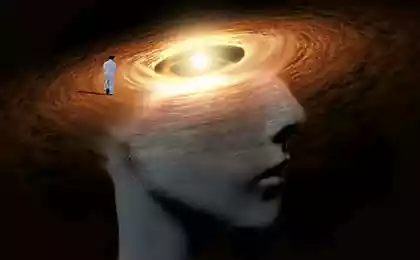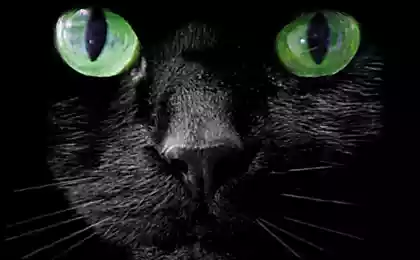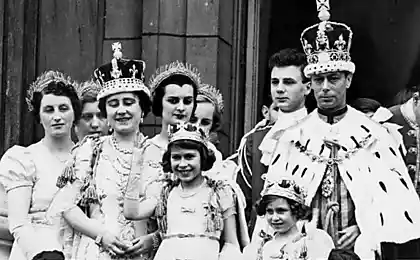755
Grief can be inherited
Is it possible to depression inherited? Someone who inherits the family silver and the house under Peter, and someone gets inherited grief. It is the causal of depression.
A legacy is something that I originally did not belong to that was someone else, belonged to someone before me, my relative ancestor. And grief is the same. Only inherited not every sorrow that has ever happened in your family, but only neotpravlennoe, never mind when the person who was supposed to grieve and cry, did not, could not, did not, did not.
And then the mountain "buried" in the family system, kept at it, handed down like a mole on the cheek or a birthmark on my stomach and the next and the next generation. As if the older generation unconsciously be delegated to Junior this grief is to experience them. But grief for it and buried that is not very the younger generation aware of what happened, that's not really saying... And by the way, what is it?
The mountain, which can be inherited and cause depression in the present generation associated with the most serious losses for the family. this loss, the death of children. often not one but several. the loss of their children when they were still kids.
Thirty six million three hundred forty thousand four hundred twelve
War, genocide and hunger not really contributed to child survival. Died out whole families. It used to be that crying was no one left. And the survivors were not to tears. And to forget as quickly as possible, they wanted it all, to erase from his memory. Those who went through the war, preferred about it once again not to speak. And that your brothers and sisters died of starvation in your arms, if they say that far not all.So, we – 30 - 45 years.
Our grandparents were famine, war and genocide. Someone hurt less, someone more. In someone's family the loss was significant. In the Kuban, for example, during the famine in 30-33 years died out entire villages. Mothers who could mourn the loss, rarely survived. And the children that survived famine and went through it all, it was not to tears. And they froze in horror and buried the horror deep inside.
Children born in remote villages of the principle "God has given children, and give children" and even survived the period of infancy; children born during the war and died one after the other; children who were placed in concentration camps; children left without parental care, and perished in the vastness of our vast country – who was crying for him? Who was it? What happened to the survivors? If not the whole race became extinct, and the remains of 5-6 children two or only one left of ten children.
What's wrong with him? What is it?
He is struggling to live. And try to forget, to hide, to bury all the horrors which he saw, as deep as he can. Never to remember not to tell anyone, to erase from memory all that he had endured, all of whom were buried and how it was. He zaplachet all this experience of terror deep inside and leave intact. In this form, and give it to your kids "the core of melancholy" or "buried hill", untouched, unmourned, frozen in a silent cry of terror mountain.
First generation.
But he, too, will have children. Children born immediately after the war.Children who live by themselves, such as grass, children have no value. Very independent children. Able all by yourself and lunch to cook and the house is managed, and in the garden as adults to work. They can be sent to train alone for a few thousand miles or four in the morning through the whole town on foot in a dairy kitchen, Yes anywhere. For it is not terrible. And not because it was a different time – "quiet and peaceful" – immediately after the war, yeah... But because the values could not imagine. "Will die, and die, there is so much then that died... and cried one". To appreciate these, we must ever remember. And howl of terror and pain. And recognize that grief happened, God forbid. And cry and remember and repent… Come with the guilt of survivors to meet... “They are dead, and I alive, God forbid... I'd rather never remember. And the children – it's so... "my shit", and who believes…”
Nineteen million four hundred forty thousand nine hundred seventy three
Disturbing, nadolinnyi, invaluable, but very strong and independent children give birth to their children. And will be very much worry about them, afraid to lose and everything to treat. To manifest their depression would not be in the form of apathy, but in the form of total anxiety. Somewhere in the back of my head, they feel and know that baby can be lost at any moment. On the one hand, they are driven by fear for their children, on the other hand, is "melancholic core" requires otherevery, to cry, to bury their children…
In the end, bury and otplatit kids! And the woman lives with this grief inside, with this pervasive fear, anxiety for the lives of their children. With grief that in her life was, she did not lose children. And the feelings she has are that she is somewhere threw them somewhere left, somewhere, lost, buried, but not done all my crying. Living with grief, inherited, and projects this grief on their children. Which, answering the need of the mother, will be hard to hurt.
Ninety seven million five hundred forty six thousand seventy eight
Second generation.
"When I feel bad, my mom immediately easier." "My mother since childhood, loves me, pays attention to me when I'm sick". "In our family, to love means to be concerned about the other."
Why not hurt if you just love sick?
To hurt means to love, care and make a happy mom, no matter how absurd it may sound. Well, who doesn't want to make mom happy?
"Melancholic core" continues its journey. In this generation of depression manifested in the form of somatization. People looking for a reason for burning is equivalent to the enormous horror that they lived in.
But you find nothing. Now, if only... the disease. Serious, terrible, thorough, between life and death, so the tension held the whole race. Then the horror living inside, balanced with the horror unfolding outside. If people are freed from disease (and remove sabalewski body) or the disease goes into remission, it starts to cover the depression, waking up, "a melancholy core."
Third generation.
And these children have children. If they decide to start their course. But these children are born with a depression in the form of melancholy. This is the most severe form of depression. These children are constantly with her to cope. Sadness, which is constantly why inside.
Ninety three million one hundred one thousand four hundred five
Fourth generation.
This generation tries to reproduce the picture of grief that occurred in the family. Or children die one after another. Or woman making the number of abortions equals the number of dead children, lost from.On the one hand, she may be trying unconsciously to restore the loss, as the clan has lost so much and give birth. On the other hand, have sort of a need to bury and mourn. She is trying unconsciously to both meet these needs, to defuse the "melancholy core."
The fifth generation follows the path first. Depression is experienced in the form of total anxiety for the lives and safety of children.
The sixth generation – the way of the second. Depression is expressed somatically in the form of systemic diseases.
And the seventh generation – the third way. Depression – in the form of melancholy.
To the seventh generation living the loss of within the genus. Traces its reach to the seventh generation.
***
Exploring this topic in therapy and meeting with its echoes in the stories of clients, I have come to the conclusion that the way "melancholic core" and its inheritance is variation. This path can go inside the generation, and forms of depression can be shared among children of the same generation.
***
Each of us wants to know what's happening to us. If the causes of situational depression can be quite easily identified – loss, separation, never mind the mountain, the experience of the crisis, and with these reasons, it is possible to work effectively in therapy, which leads to the disappearance of depression – how to work with depression inherited? After all, to experience grief, it is necessary to pay to someone who is grieving. And it is impossible to experience their grief, otherevery, to mourn instead of someone. You can experience only his own. Well, when genus is at least fragments of stories, memories about what happened then. In this case, therapy can go through the whole gamut of feelings to the situation, to people, to all who were there and especially those who died waiting for you, not to please your birth, not having met you in this world. Who became your grandmother or grandfather, aunt or uncle who has not smiled at you and walked away, leaving you lonely shivers in this hostile world. You can be mad at him. And envy your children that they have.
The experience of grief is filled with many conflicting emotions in him and a burning resentment, and anger, and pity, and love, and longing, and compassion and guilt and despair, desolation, loneliness. Suffering the loss in horizontal our lives, we go through all these feelings, and if not block them, the grief subsides, the wound heals, and after a while it speaks not of pain, but a quiet sadness and gratitude, hope and faith in life.
Woe that happened in our family, became a burden for those who survived. It climbed the tree of life to the next generation, remains an open wound in the heart of each born again. Survived by his of the grief about what happened, we can discharge a part of the kernel. And to make the tragedy available to mourning, to make part of the history of our kind, the things you grieve and be sad about what you know and remember, but not necessarily to take with us.
Eachthe story once completed. But something drags on for too long.
We are not born a clean sheet in a sterile environment with perfect parents. The history of generations anyway sounds to us. It has an impact on the quality of our lives, how we live a life of its own. And the lives of our children and grandchildren.
What it will be that they will take with them partly depends on us. published
Author: Irina Dubova
P. S. And remember, just changing your mind - together we change the world! ©
Source: dybova.ru/otzyvy/
A legacy is something that I originally did not belong to that was someone else, belonged to someone before me, my relative ancestor. And grief is the same. Only inherited not every sorrow that has ever happened in your family, but only neotpravlennoe, never mind when the person who was supposed to grieve and cry, did not, could not, did not, did not.
And then the mountain "buried" in the family system, kept at it, handed down like a mole on the cheek or a birthmark on my stomach and the next and the next generation. As if the older generation unconsciously be delegated to Junior this grief is to experience them. But grief for it and buried that is not very the younger generation aware of what happened, that's not really saying... And by the way, what is it?
The mountain, which can be inherited and cause depression in the present generation associated with the most serious losses for the family. this loss, the death of children. often not one but several. the loss of their children when they were still kids.
Thirty six million three hundred forty thousand four hundred twelve
War, genocide and hunger not really contributed to child survival. Died out whole families. It used to be that crying was no one left. And the survivors were not to tears. And to forget as quickly as possible, they wanted it all, to erase from his memory. Those who went through the war, preferred about it once again not to speak. And that your brothers and sisters died of starvation in your arms, if they say that far not all.So, we – 30 - 45 years.
Our grandparents were famine, war and genocide. Someone hurt less, someone more. In someone's family the loss was significant. In the Kuban, for example, during the famine in 30-33 years died out entire villages. Mothers who could mourn the loss, rarely survived. And the children that survived famine and went through it all, it was not to tears. And they froze in horror and buried the horror deep inside.
Children born in remote villages of the principle "God has given children, and give children" and even survived the period of infancy; children born during the war and died one after the other; children who were placed in concentration camps; children left without parental care, and perished in the vastness of our vast country – who was crying for him? Who was it? What happened to the survivors? If not the whole race became extinct, and the remains of 5-6 children two or only one left of ten children.
What's wrong with him? What is it?
He is struggling to live. And try to forget, to hide, to bury all the horrors which he saw, as deep as he can. Never to remember not to tell anyone, to erase from memory all that he had endured, all of whom were buried and how it was. He zaplachet all this experience of terror deep inside and leave intact. In this form, and give it to your kids "the core of melancholy" or "buried hill", untouched, unmourned, frozen in a silent cry of terror mountain.
First generation.
But he, too, will have children. Children born immediately after the war.Children who live by themselves, such as grass, children have no value. Very independent children. Able all by yourself and lunch to cook and the house is managed, and in the garden as adults to work. They can be sent to train alone for a few thousand miles or four in the morning through the whole town on foot in a dairy kitchen, Yes anywhere. For it is not terrible. And not because it was a different time – "quiet and peaceful" – immediately after the war, yeah... But because the values could not imagine. "Will die, and die, there is so much then that died... and cried one". To appreciate these, we must ever remember. And howl of terror and pain. And recognize that grief happened, God forbid. And cry and remember and repent… Come with the guilt of survivors to meet... “They are dead, and I alive, God forbid... I'd rather never remember. And the children – it's so... "my shit", and who believes…”
Nineteen million four hundred forty thousand nine hundred seventy three
Disturbing, nadolinnyi, invaluable, but very strong and independent children give birth to their children. And will be very much worry about them, afraid to lose and everything to treat. To manifest their depression would not be in the form of apathy, but in the form of total anxiety. Somewhere in the back of my head, they feel and know that baby can be lost at any moment. On the one hand, they are driven by fear for their children, on the other hand, is "melancholic core" requires otherevery, to cry, to bury their children…
In the end, bury and otplatit kids! And the woman lives with this grief inside, with this pervasive fear, anxiety for the lives of their children. With grief that in her life was, she did not lose children. And the feelings she has are that she is somewhere threw them somewhere left, somewhere, lost, buried, but not done all my crying. Living with grief, inherited, and projects this grief on their children. Which, answering the need of the mother, will be hard to hurt.
Ninety seven million five hundred forty six thousand seventy eight
Second generation.
"When I feel bad, my mom immediately easier." "My mother since childhood, loves me, pays attention to me when I'm sick". "In our family, to love means to be concerned about the other."
Why not hurt if you just love sick?
To hurt means to love, care and make a happy mom, no matter how absurd it may sound. Well, who doesn't want to make mom happy?
"Melancholic core" continues its journey. In this generation of depression manifested in the form of somatization. People looking for a reason for burning is equivalent to the enormous horror that they lived in.
But you find nothing. Now, if only... the disease. Serious, terrible, thorough, between life and death, so the tension held the whole race. Then the horror living inside, balanced with the horror unfolding outside. If people are freed from disease (and remove sabalewski body) or the disease goes into remission, it starts to cover the depression, waking up, "a melancholy core."
Third generation.
And these children have children. If they decide to start their course. But these children are born with a depression in the form of melancholy. This is the most severe form of depression. These children are constantly with her to cope. Sadness, which is constantly why inside.
Ninety three million one hundred one thousand four hundred five
Fourth generation.
This generation tries to reproduce the picture of grief that occurred in the family. Or children die one after another. Or woman making the number of abortions equals the number of dead children, lost from.On the one hand, she may be trying unconsciously to restore the loss, as the clan has lost so much and give birth. On the other hand, have sort of a need to bury and mourn. She is trying unconsciously to both meet these needs, to defuse the "melancholy core."
The fifth generation follows the path first. Depression is experienced in the form of total anxiety for the lives and safety of children.
The sixth generation – the way of the second. Depression is expressed somatically in the form of systemic diseases.
And the seventh generation – the third way. Depression – in the form of melancholy.
To the seventh generation living the loss of within the genus. Traces its reach to the seventh generation.
***
Exploring this topic in therapy and meeting with its echoes in the stories of clients, I have come to the conclusion that the way "melancholic core" and its inheritance is variation. This path can go inside the generation, and forms of depression can be shared among children of the same generation.
***
Each of us wants to know what's happening to us. If the causes of situational depression can be quite easily identified – loss, separation, never mind the mountain, the experience of the crisis, and with these reasons, it is possible to work effectively in therapy, which leads to the disappearance of depression – how to work with depression inherited? After all, to experience grief, it is necessary to pay to someone who is grieving. And it is impossible to experience their grief, otherevery, to mourn instead of someone. You can experience only his own. Well, when genus is at least fragments of stories, memories about what happened then. In this case, therapy can go through the whole gamut of feelings to the situation, to people, to all who were there and especially those who died waiting for you, not to please your birth, not having met you in this world. Who became your grandmother or grandfather, aunt or uncle who has not smiled at you and walked away, leaving you lonely shivers in this hostile world. You can be mad at him. And envy your children that they have.
The experience of grief is filled with many conflicting emotions in him and a burning resentment, and anger, and pity, and love, and longing, and compassion and guilt and despair, desolation, loneliness. Suffering the loss in horizontal our lives, we go through all these feelings, and if not block them, the grief subsides, the wound heals, and after a while it speaks not of pain, but a quiet sadness and gratitude, hope and faith in life.
Woe that happened in our family, became a burden for those who survived. It climbed the tree of life to the next generation, remains an open wound in the heart of each born again. Survived by his of the grief about what happened, we can discharge a part of the kernel. And to make the tragedy available to mourning, to make part of the history of our kind, the things you grieve and be sad about what you know and remember, but not necessarily to take with us.
Eachthe story once completed. But something drags on for too long.
We are not born a clean sheet in a sterile environment with perfect parents. The history of generations anyway sounds to us. It has an impact on the quality of our lives, how we live a life of its own. And the lives of our children and grandchildren.
What it will be that they will take with them partly depends on us. published
Author: Irina Dubova
P. S. And remember, just changing your mind - together we change the world! ©
Source: dybova.ru/otzyvy/
Cleaning and disinfection of air conditioners with their hands
Protection from the evil eye: no esoterics!























